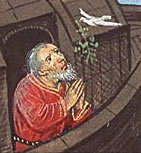
Jewish
Sermons and commentaries | The Noachide laws
Comment: Despite major differences in interpretation and approach[1] I have not sought to separate Orthodox, Conservative and Reform opinions. For one thing, the data are not always present to decide. Again, let me emphasize that I did not exclude anything from this page or others on purpose. If you have relevant material, please email [email protected]
Sermons and commentaries
The Children Of Noach by Rabbi Neal Joseph Loevinger (from the My Jewish Learning Noah page) draws a lesson from mankind's doubly single ancestry—that everyone has a common ancestor in both Adam and Eve and Noah and "his (unfortunately unnamed) wife."
"That's who we're descended from—somebody who saw a better way than others did, who lived his values and faith, who rose above a society and treated people as if they were not only related, but created in the Image of God."
Homeschooling Diary by Steve Waldman, the "Accidental Torah Teacher." (Scroll down to "The Flood.") Parent describes his children's reactions to Noah and the Asian Tsunami.
"One of the undercurrents of both conversations was that it was OK to argue with God, and so it's certainly OK to resist temporal authority that's doing something unjust."
God Of Jews, God Of Humanity by Rabbi Bradley Shavit Artson[2] (from the My Jewish Learning Noah page), on common humanity and the seven Noahide commandments.
"If God is the God of the whole world, then wouldn't God have the same relationship with everybody? The Torah presents that paradox to us—God is the God of the Jewish People, and also the God of all humanity. That dual set of concerns are mediated through the Laws of the B'nai Noah, the Children of Noah, a way that Judaism and halakhah (Jewish law) incorporate God's sovereignty and love for all people with God's unique mission for the Jews."
The Miraculous Nature Of Covenant by Rabbi Shimon Felix (from the My Jewish Learning Noah page), on the first covenant and what being a "covenantal" people means:
"The very idea of a covenant, a deep, lasting connection and partnership, an ultimate commitment between two individuals, can itself be seen as an abrogation of the way of the world, and is therefore itself a kind of miracle."
Lessons Of The Flood by Rabbi Ephraim Z. Buchwald (from the My Jewish Learning Noah page). Buchwald contrasts the Babylonian and Torah account of the Flood and examines Noah's actions in light of his status as a survivor. Includes an interesting explanation for Noah's curse of Canaan.[3]
Flooded With Violence by David Nelson. Daring reinterpretation of Noah's of why God decides not to destroy the earth again (from the My Jewish Learning Noah page):
Perhaps the answer lies in Noah's response to the flood. When the waters dry up, Noah leaves the ark. We expect some expression of gratitude to God for having been spared. A song, perhaps, or a dance. Instead, Noah builds an altar and, unbidden, sacrifices some animals to God. … God realizes that even Noah, the finest of his generation, whose intentions are unimpeachably pure, expresses gratitude with a violent act."
![]() Noah's Ark and the Gift of Cosmic Speech by Rabbi Ginsburgh. Coming off the observation that the Hebrew word for "ark" also means "word," Ginsburgh interprets "enter the ark" to require "every word that we think and speak [be] holy—whether they are words of Torah, prayer, or even seemingly mundane words spoken to create union with another soul." After this profound, even moving, injunction Ginsburgh turns to the numerological significance of the ark's proportion, an exegetical technique with less popular appeal.
Noah's Ark and the Gift of Cosmic Speech by Rabbi Ginsburgh. Coming off the observation that the Hebrew word for "ark" also means "word," Ginsburgh interprets "enter the ark" to require "every word that we think and speak [be] holy—whether they are words of Torah, prayer, or even seemingly mundane words spoken to create union with another soul." After this profound, even moving, injunction Ginsburgh turns to the numerological significance of the ark's proportion, an exegetical technique with less popular appeal.
Biblical Affirmative Action: Noah As A Product Of His Generation by Ilan Haber and Avi Weinstein (from the My Jewish Learning Noah page).[4]
"The talmudic discussion of Noah's righteousness sheds light on our understanding of affirmative action."
Protecting Biodiversity: A Covenant With Every Living Thing by Rabbi David Rosenn (from the My Jewish Learning Noah page). "Do we dare allow ourselves to proceed with that which God has foresworn?"
Noah by Rabbi Stuart Weinblatt (October 2001), B'nail Tzedek, Potomac, MD. Sermon (note the date) opens with a call for people to recognize that there are "many strands within the Moslem religion and among many practitioners, which have a tendency towards violence, intolerance of non-Muslims, and support the tenet that they must evict non-Muslims from Moslem lands." Turning to Noah, Weinblatt concludes:
"Today we must also struggle to preserve the blessing of God's world as well by speaking truth and not being afraid to challenge those who seek to destroy the world."
Two short sermons by W. Gunther Plaut and Roslyn Roucher (October 13, 1996). Plaut reminds:
"And though God puts the rainbow in the sky as a symbol that never again will flood waters drown us, there remains the unhappy possibility that we might destroy ourselves and the earth along with us.
Righteous Or Blameless by Alan Bayer (from the My Jewish Learning Noah page), on what Bertrand Russell called the "fallacy of the moral superiority of the oppressed."
Noah: Two Birds by Rabbi Bernard L. Berzon, on the raven and the dove, and it means to be a raven or dove today.
"Where were the McGoverns and the Fulbrights and the so-called liberal columnists of the press who were so concerned about Vietnam and said not a word against the Soviet Union for arming the Arabs to attack Israel on the most sacred day in the Jewish calendar? Ah yes! The "noisemakers" who are vociferous in their demands for justice to criminals and depraved renegades, kept a deafening silence when the lives of Jews were at stake; and they continue their silence to this day."
Essay by Rabbi Shraga Simmons of Aish HaTorah, on the environment, responsibility and other topics.
The numerology of the Ark's dimensions from Torah.org.
Rabbi Schneerson's thoughts on Noah and the duty to correct others, from the Lubavitch Youth Organization. Scroll down to "Living with the Rebbe."
The Noah story retold by Nancy Reuben Greenfield, a freelance writer (from the My Jewish Learning Noah page).
The Noachide laws
Comment: This topic may confuse many many Christians. In a nutshell, traditional Judaism holds that, although non-Jews are not required to follow the complete Law revealed to Moses and incumbent upon Jews, they must still follow God's injunctions to Noah and other pre-Mosaic figures. (Noah was not actually Jewish, nor were Adam, Eve, etc.[5]) Although Judaism does not generally seek out converts, many Jews feel responsible for "getting the word out" about these "Noachide" laws or commandments. They are commonly numbered seven, but can be sudivided into many more.
The Seven Commandments of the Sons of Noah by Moshe Greenberg, from Jewish Heritage Online Magazine's interesting page on the various sevens in Jewish scripture and lore.
"That the Gentiles' worship of 'false gods' was a sin came to be a common doctrine only in Second Temple times. Deuteronomy even reflects the notion that the misdirected worship of the pagans was a divine ordinance. The first hints of a new attitude occur in Jeremiah, with polemical fragments against idolatry addressed to the pagans. From here it is but a step to making the renunciation of false gods one of the minimal obligations of all people. This step was taken in the later formulation of the 'Noahite laws.'"
What are the Noachide laws? from Soc.Culture.Jewish. The seven laws gentiles are obligated to follow, with their elaboration into 66 laws.
Noachian Laws from the 1901-1906 Jewish Encyclopedia. Entry by by Isidore Singer and Julius H. Greenstone. Rabbinic laws of punishment are not, perhaps, going to win many friends among contemporary non-Jews or feminists: [6]
AskNoah.org, one of many websites set up to educate gentiles to follow the Noahide laws. (See Wikipedia for more.)
Wikipedia: Noahide Laws. Decent explanation, also delving into whether Judaism considers Islam and Christianity to be Noahide religions, Christian criticisms of the laws, etc. Has more links at the bottom.
The Path of the Righteous Gentile: An Introduction to the Seven Laws of the Children of Noah by Chaim Clorfeneand Yaakov Rogalsky. Recommended various places; I have not read it.
In-depth discussion from www.moshiach.com.
Notes:
- would any Orthodox rabbi would approve of David Nelson's "Flooded with Violence" (above) (back)
- I was struck by Rabbi Artson's Credo from his University of Judaism homepage. (back)
- Editorial comment: This interpretation is a fine example of the upside of the human capacity to reinterpret scripture. To me at least, the cursing of Canaan is in its historical and intellectual context a mere aetiology for Canaan's later subjugation to Israel (an interpretation that finds support in Leviticus 18.24ff.). There are a lot of such aetiologies in Genesis, and my eye would normally flick over it. To a contemporary worshipper the passage is likely to arouse either indifference—who are the ancient Canaanites to me?—or moral unease—does God condemn races for an ancestor's guilt? Rabbi Buchwald's interpretation heads in a very different direction, and to me at least, seems both critically unsound and divinely inspired:
"Why does Noach curse his grandson and not his son? Perhaps it is because, of all the children, Cham was the only one who was himself a father. Cham should have been aware of how difficult it is to be a parent. Of all the children, Cham should have been most sensitive to Noach's plight. Yet he was the least sensitive!
(back)
Noach says, if that's the way you behave, if that's the model you intend to provide for your children, if you respond to a person in need by acting insensitively, the end result will inevitably be that your own child, Canaan, will be a slave. Just like you, he will be unable to control himself. He will be a slave to his own passions and needs." - This position would seem to fit better with race-blind affirmative action programs that, for example, allow the top X percent of a high-school's graduates into college, whether the school be in the affluent suburbs, the inner city or a meth-soaked rural area. (back)
- However, see the Jewish Encyclopedia on Noah, mentioning a Rabbinic tradition that he was born circumcised! Does this count? (back)
- "In the elaboration of these seven Noachian laws, and in assigning punishments for their transgression, the Rabbis are sometimes more lenient and sometimes more rigorous with Noachidæ than with Israelites. With but a few exceptions, the punishment meted out to a Noachid for the transgression of any of the seven laws is decapitation, the least painful of the four modes of execution of criminals … The many formalities of procedure essential when the accused is an Israelite need not be observed in the case of the Noachid. The latter may be convicted on the testimony of one witness, even on that of relatives, but not on that of a woman." (back)

All material © 2000–2005 Tim Spalding. Books presented in association with Amazon.com.
If you enjoy this site you may like this other site by me:
Angels on the Web. Everything about angels, from art of every period, to religion, poetry and movies.
Mermaids on the Web. 1,320 pictures, plus folk-tales, stories and movies.